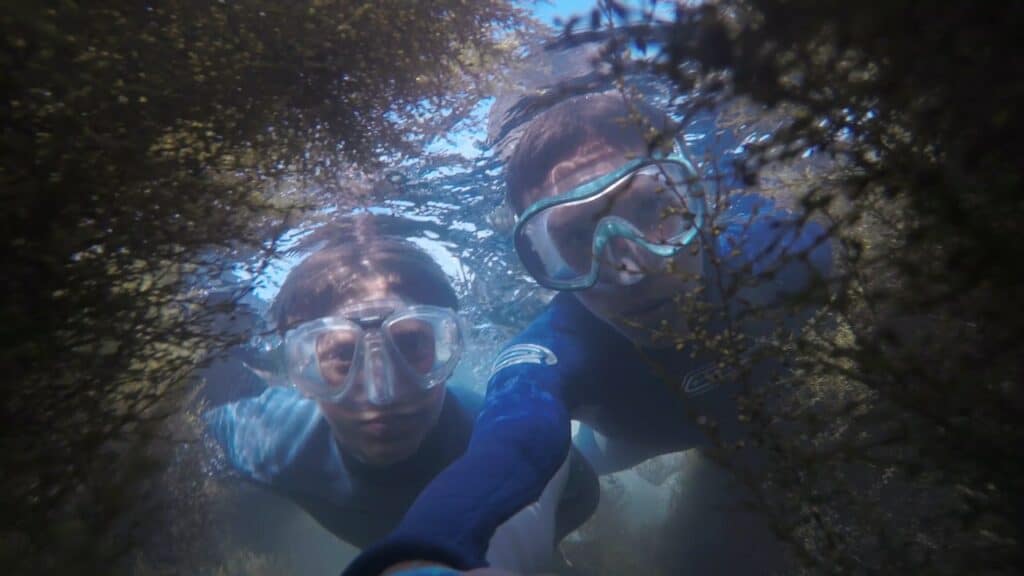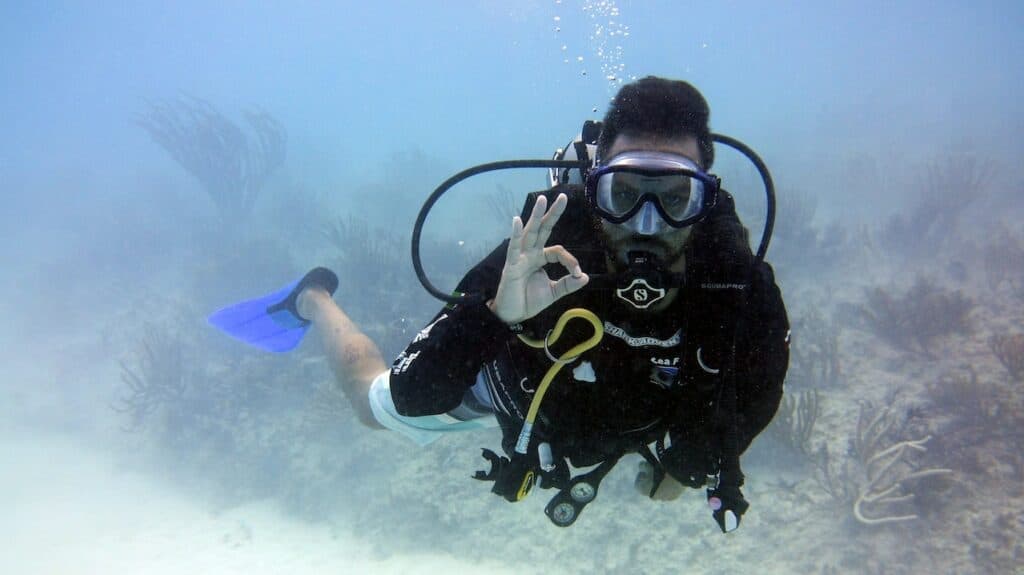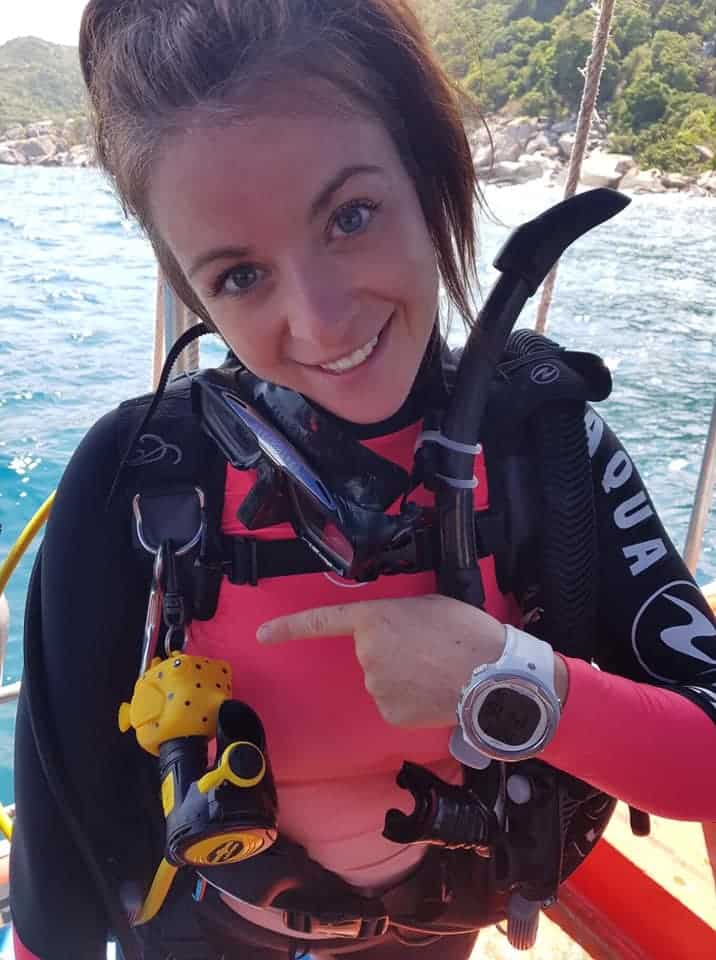Scuba diving is a sport that through exploration of the underwater world allows you to view marine environments up close and personal. So what happens if you are visually impaired and need glasses?
Read on to find out the best course of action to take in ensuring that you can improve your vision underwater and see the dive site.
While it is not possible to actually have your regular glasses underneath you dive mask. There are now many options to help you see clearly.
Here is everything you need to know.
This article is not medical advice and is merely to help you dive safely, please contact your instructor and dive doctor for advice.

Table of Contents
How Can You See Underwater if You Wear Glasses?
Many people ask if they can keep their glasses on underneath their mask. This is not possible because in order for the scuba mask to be effective and keep water out, it has to make a seal around your face.
If you want to see with 20/20 vision underwater, then your two options are contact lenses or having prescription lenses fitted onto your mask.
Contact Lenses
It is possible to wear contacts as normal underneath your scuba diving mask as they do not interfere with how the mask seals to your face.
You can wear your regular soft contact lenses underwater. However, hard contact lenses are not ideal as they are gas permeable, meaning air bubbles can form between the lens and your eye.
Despite wearing the correct scuba mask, water entering your mask may be inevitable and sometimes necessary. To avoid losing them, i would recommend keeping your eyes closed while clearing your mask and then blinking rapidly to clear water droplets from your eyelashes.
Prescription Scuba Mask
A prescription scuba diving mask is the preferred option if you are going to be diving regularly especially on the same day, as you can swap back and forth from your mask in water, to your glasses after diving.
These corrective lenses are now widely available from many different mask brands, however they can be rather expensive.
If you are planning to purchase one of these prescription masks then i would highly recommend trying a few on to make sure it fits your face properly and that you are comfortable in it.
Can You Wear Contact Lenses Scuba Diving
Although wearing contact lenses while scuba diving is common, it does come with its own specific risks.
It is worth mentioning that there are no specific rules set by WRSTC or the training agencies on the use of contact lenses. However in this article from PADI, the worlds largest scuba training agency, you will see that hard gas permeable contact lenses are not ideal. Potential risks include:
Chance of air bubbles forming in between lens and cornea.
Blurry vision.
Eyes feeling dry.
Higher chance of losing the lens mid-dive.
Soft contact lenses are a much safer option however they also come with a small risk. It has been reported in some cases that they can get stuck to the eye due to increased pressure at depth. This is rare and you can take steps to prevent this by taking the following steps:
Bring spare lenses and change them in between dives.
Rinse your eyes with fresh water in between dives to remove any potential bacteria that may have formed.
Use disposable daily contact lenses
Risks of Diving with Poor Eyesight
When you sign up to take your first scuba lesson you will be presented with the WRSTC medical form. On this for you will be asked to answer yes or no to the question about having eye surgery within the last 3 months. If the answer is no then you are considered fit to dive.
This means that there is no specific requirement for the quality of your vision when learning to scuba dive. In fact it is even possible for blind people to learn how to dive and is used as therapeutic.
Despite this it is still considered sensible to communicate any concerns about your eyesight to your dive instructors or guides and come up with the best action plan for you. This gives you the best chance of navigating some of the following potential hazards.
Being unable to navigate
Our vision is different underwater even if we have good vision due to visual reversal, natural magnification and loss of color. If you are not seeing things clearly on top of this then you may be putting yourself at risk. When diving on a coral reef there are many poisonous creatures that you do not want to bump into. You may also want to learn to navigate a shipwreck which could be catastrophic with poor vision.
Being unable to communicate
Scuba diving is a team sport and communication with your dive buddies is key for the safety of your fellow divers. If you need to communicate effectively due to your poor vision, you may miss an important hand signal from your buddy.
Being unable to read your instruments
It is essential on any recreational dive that you clearly read your instruments. You will need to keep track of your air supply, depth, no decompression limits and safety stops. Failing to do so can lead you to running out of air and significantly increase your risk of decompression illness.

What Glasses Wearers Should Do Before Scuba Diving
No matter your personal choice on prescription dive masks or contact lenses, you should have a routine in place to ensure that you do not find yourself in a position where you cannot see properly underwater.
Here is a handy checklist that you can follow to make sure you always have perfect vision underwater:
Prepare your prescription dive mask
Check with your manufacturer to make sure you prep your new mask lens so that it does not fog up and limit your vision. Most new masks have a silicone layer to protect the lens in transit. The manufacturer will be able to give you the best advice on how to eliminate fogging.
Bring spare contact lenses
If you choose to dive in soft contact lenses then you should bring spares. This is especially important if you are on a long trip and do not have access to an optician that has your prescription to hand.
Have adequate storage for your mask or lenses
Whether you are diving with a prescription mask or soft contact lenses, make sure you have the right bag or box to carry them in. Prescription lenses are expensive and a contact lens is extremely fragile. You can’t just throw them in with the rest of your dive gear.
Tell your dive instructor, guide or buddies
If you are learning to scuba dive for the first time, you will be required to complete skills that involve having your mask off your face with your eyes exposed to the water. Make sure you tell your instructor so that they can adapt their teaching techniques to suit you.
If you are already certified, be sure to let your guid or buddies know about your eye sight should you encounter a problem while underwater. Clear communication will give them the best chance of helping you while avoiding any confusion.
Can Glasses Wearers Snorkel?
Snorkeling as a glasses wearer is possible but comes with its own set of problems. Usually as a snorkeler you are further away from the subject you are viewing because you don’t have the air supply to stay underwater.
You still have lots of great options for a prescription snorkel mask if you are going to be in the water regularly. Check out Snorkel masks for glasses wearers to find a mask that will fit you.
Can You Wear Contact Lenses Snorkeling
Wearing your contact lenses inside your snorkel mask should not be a problem. Especially as you are not facing the same pressure changes that a scuba dive encounters.
Having a properly fitting mask is important to ensure water stays out, check out Snorkel masks for glasses wearers to help you find the

